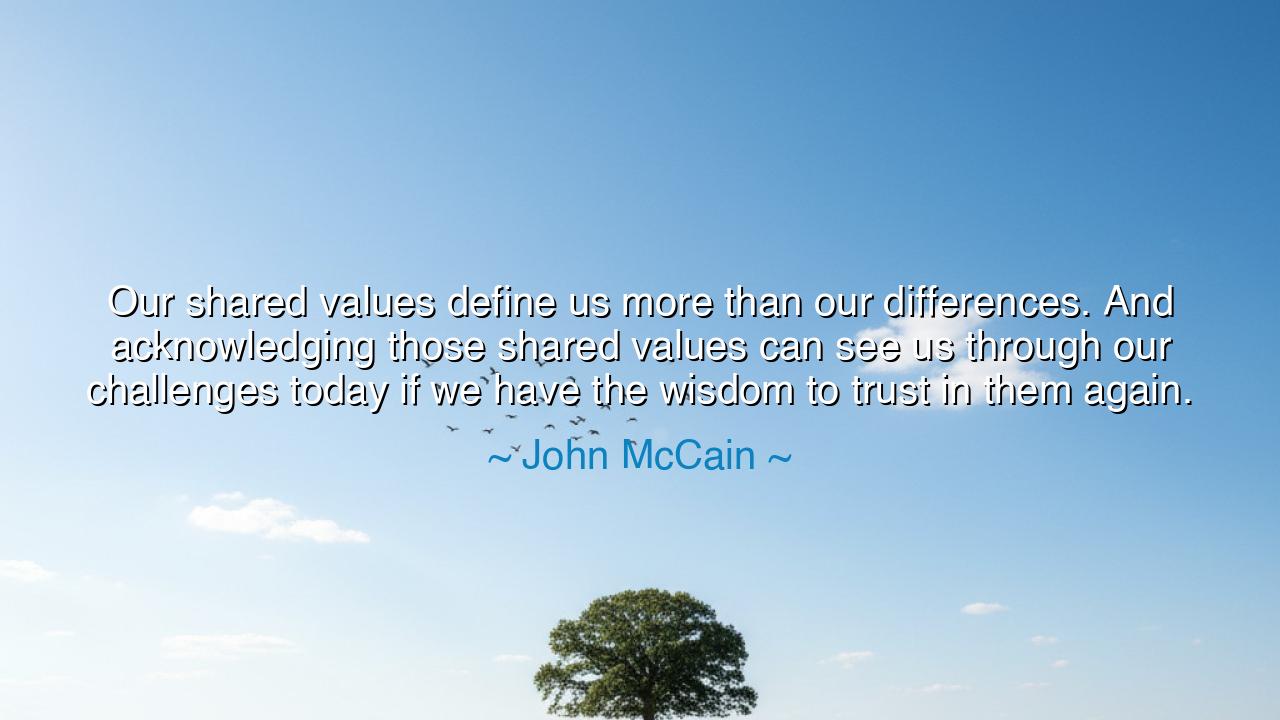
Our shared values define us more than our differences. And
Our shared values define us more than our differences. And acknowledging those shared values can see us through our challenges today if we have the wisdom to trust in them again.






Hear, O seeker of wisdom, the steadfast words of John McCain, warrior and statesman: “Our shared values define us more than our differences. And acknowledging those shared values can see us through our challenges today if we have the wisdom to trust in them again.” These words, spoken with the weight of sacrifice and the scars of endurance, call us back to the ancient truth—that what binds us together is stronger than what divides us, if only we have the courage to remember.
The origin of this wisdom lies deep in McCain’s life. As a prisoner of war, confined in darkness and pain, he endured not by dwelling on differences of class, region, or creed, but by clinging to the shared values of freedom, dignity, and loyalty that bound him to his fellow captives. Later, in the halls of politics, he witnessed how nations fracture when differences are exalted above common principles. Thus, he proclaimed this truth: unity is born not of sameness, but of recognizing what we hold in common, even amidst diversity.
The ancients knew this lesson well. The Greek city-states, often at odds, were able to rally together against the invading Persian empire, not because they were alike, but because they shared a love of liberty. In their unity, they discovered strength far greater than their quarrels. So too in Rome: though citizens differed in origin, what defined them was not their differences but their common Roman identity, their devotion to law, order, and the Republic. In every age, peoples who remembered their shared principles endured, while those who forgot them collapsed into ruin.
History also offers us the tale of Abraham Lincoln, who, in the midst of America’s Civil War, reminded his people that the nation was conceived in liberty and dedicated to the proposition that all men are created equal. Amid division and bloodshed, he called the people back to their shared values, knowing that only by returning to that foundation could the nation survive. His words echo McCain’s across the centuries: it is not differences, however sharp, that define us, but the truths we hold in common.
Yet McCain’s words also bear a warning. For when a people forget their shared values, when they exalt division over unity, their strength is squandered. Discord becomes their master, and enemies find opportunity in their weakness. The wisdom to trust in shared values again is not an idle hope—it is a necessity for survival. Without it, no nation, no community, no family can endure.
The lesson, O listener, is clear: if we would face the challenges of today—whether war, injustice, or division—we must look first not to what separates us, but to what unites us. Our differences need not be erased, but they must not be exalted above the values we share: justice, compassion, freedom, and human dignity. These are the bonds that outlast conflict, the compass that guides through storm.
Practical wisdom flows from this. In daily life, seek out the common ground with those who differ from you. In times of conflict, remember the values that bind your community, your nation, your family. Choose dialogue over enmity, cooperation over suspicion. Teach your children not to fear differences, but to respect them, while grounding them firmly in the principles that hold humanity together. In this way, you will not only preserve peace, but also strengthen the foundation of society itself.
So remember the words of John McCain: our shared values define us more than our differences. In every generation, this truth must be rediscovered and lived anew. For in unity born of shared principles lies the strength to overcome any challenge, the wisdom to endure any trial, and the hope to pass on a brighter world to those who come after us.






AAdministratorAdministrator
Welcome, honored guests. Please leave a comment, we will respond soon